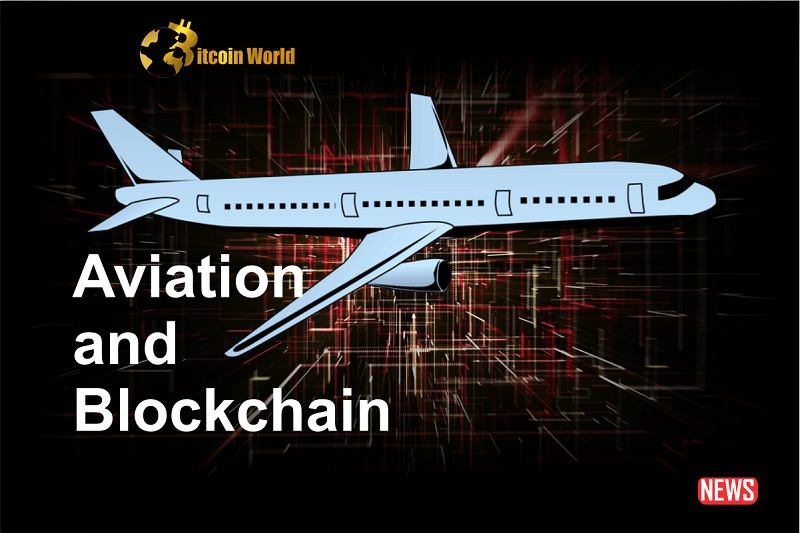Remember the days of packed airports and seamless travel? The COVID-19 pandemic brought that era to a screeching halt, grounding planes and leaving the aviation industry reeling. Imagine airlines losing a staggering $168 billion in 2020 alone! Revenues plummeted by 55%, effectively setting the industry back 16 years. But within this crisis, a beacon of innovation emerged: blockchain technology. Let’s explore how this groundbreaking technology is not just helping aviation recover, but also propelling it into a more efficient and secure future.
The Pandemic’s Turbulence: A Catalyst for Change
The pandemic didn’t just impact bottom lines; it fundamentally shifted how we travel. Suddenly, historical customer data became about as useful as a paper map in the age of GPS. Uncertainty became the only certainty. The aviation sector, often relying on legacy systems, found itself particularly vulnerable as travel ground to a halt. This disruption, however, highlighted the urgent need for modernization. Think contactless travel, seamless bag tracking, and secure identity verification – all critical for navigating the ‘new normal’. This is where blockchain’s potential to revolutionize the industry truly began to shine.
From Survival to Innovation: Blockchain Takes Flight
Initially, airlines were focused on survival: cutting costs, ensuring safety, and retaining staff. But the long-term challenges loomed large: modernizing outdated core technologies and building resilient infrastructure. Technologies like blockchain, alongside big data, cloud computing, predictive analytics, and business intelligence, offered a lifeline – a path towards both modernization and cost reduction. It wasn’t just about getting back to normal; it was about building back better.
How Did Forward-Thinking Companies Respond?
The crisis became an incubator for innovation. Consider these examples:
- AI for Optimized Cargo: Airlines started leveraging Artificial Intelligence to precisely determine cargo capacity on passenger planes, factoring in everything from weather patterns to passenger weight. This level of granular insight was simply unattainable with traditional aviation tools.
- Contactless Solutions: Airlines actively explored and implemented contactless travel options to minimize physical interaction and enhance passenger safety.
- Blockchain Loyalty Programs: Innovative loyalty programs powered by blockchain offered greater transparency and security for frequent flyers.
- Enhanced Call Centers: Technology upgrades, including AI-powered solutions, streamlined call center processes to handle increased inquiries efficiently.

Beyond Digital: Innovations Taking Off
The wave of innovation wasn’t limited to digital solutions. We also saw significant advancements in:
- Electric Aircraft: Manufacturers are developing electric aircraft with vertical takeoff and landing capabilities, potentially revolutionizing urban air travel.
- Supersonic Flight: Research into commercial supersonic flight gained momentum, promising faster long-distance travel.
- Sustainable Aviation Fuels: The pursuit of sustainable aviation fuels accelerated, driven by environmental concerns and the need for a greener future.
Blockchain’s Blueprint for Aviation Transformation
The numbers speak for themselves: the aviation blockchain market is projected to reach $1.394 million by 2025, boasting a compound annual growth rate (CAGR) of 22.1%. But where exactly is blockchain making its mark?
- Identity Verification: Blockchain provides a secure and tamper-proof way to verify passenger identities, streamlining check-in and security processes.
- Digital Health Passports: During the pandemic, blockchain facilitated the secure and efficient management of digital health credentials.
- Baggage Handling: Imagine a world where lost luggage is a distant memory. Blockchain can track baggage in real-time, increasing efficiency and reducing passenger anxiety.
- Leasing and Maintenance: Tracking aircraft parts and maintenance records on a blockchain ensures transparency and accountability.
- Payment Reconciliation: Blockchain can simplify and expedite payment processes between airlines and various stakeholders.
- Cargo Tracking: Similar to baggage, blockchain offers transparent and reliable tracking of cargo shipments.
- Loyalty Programs: Blockchain-based loyalty programs offer secure and transferable rewards, enhancing customer engagement.
The Power of Provenance and Self-Sovereign Identity
Think about the journey of a piece of cargo or a passenger’s luggage. Blockchain technology, particularly the concept of provenance, allows for transparent tracking every step of the way. Even frequent flyer miles can be securely managed and tracked. Furthermore, the need for modern settlement systems in the evolving airline industry creates fertile ground for blockchain and tokenization.
The pandemic also significantly accelerated the adoption of blockchain-based self-sovereign identity (SSI) solutions. SSI empowers individuals with control over their digital identities, making identification processes more efficient and secure. Blockchain-based digital health IDs were a prime example, enabling airlines to navigate evolving entry requirements seamlessly. With SSI, you own your data and decide who has access to it.
Navigating the Turbulence: Challenges to Blockchain Adoption
While the potential is immense, the path to widespread blockchain adoption in aviation isn’t without its bumps. Some key hurdles include:
- Legacy Technology: The industry’s reliance on systems dating back to the 1960s presents a significant challenge in transitioning to modern, blockchain-based solutions. Think of it like trying to install the latest software on a vintage computer.
- Consumer Education: Educating passengers about the benefits and security of blockchain-based solutions is crucial for adoption.
- Regulatory Frameworks: The lack of clear and consistent global regulatory frameworks for blockchain technology creates uncertainty and can slow down implementation.
- Bandwidth Limitations: Certain applications of blockchain might require significant bandwidth, which could be a limitation in some environments.
- Harmonization of Standards: Achieving global regulatory harmonization to align with rapidly evolving technology is a complex but necessary step.
Charting a Course for the Future
Despite these challenges, the future of aviation is increasingly intertwined with blockchain technology. As companies and governments gain a clearer understanding of its capabilities, the industry has a unique opportunity to embrace a technology stack that is secure, fast, flexible, interoperable, trustless, confidential, and user-friendly. By proactively addressing the existing hurdles, the aviation industry can position itself for a future that is not only resilient but also technologically advanced, offering a smoother and more secure experience for travelers worldwide.
Disclaimer: The information provided is not trading advice, Bitcoinworld.co.in holds no liability for any investments made based on the information provided on this page. We strongly recommend independent research and/or consultation with a qualified professional before making any investment decisions.




